Golf
Mr. Analyst, the mechanical golfer
In 1966, Golfcraft of Escondido, California debuted a robot golfer whose job was to test new golf clubs and balls. They held a contest to name him, and after receiving over 1500 entries decided to call him "Mr. Analyst."
More details from the Long Beach Press-Telegram (Aug 21 1966):
The robot is the answer to all those who have ever left a course in disgust, muttering something about that not being a fit game for man or beast.
Mr. Analyst is the product of the tinkering of William J. Glasson, a golfer who also has concluded, from time to time, that it was a game fit not for man or beast.
Glasson started toying with his mechanical monster while trying to figure out scientifically how to lower his five handicap on the links. At the time he had graduated from Massachusetts Institute of Technology and was working on the Falcon missile.
"The monster was still a crude thing then," Glasson reminisces, "mounted on a wooden tripod. And I had to crank it manually to get it to work. At first it would only hit the ball about 125 yards. But, after making several modifications and adjustments it started belting it 200 yards and I got excited about its possibilities."
At a recent demonstration, the robot showed graphically how it has been improved by socking balls one after another in low, screaming trajectories to a distance of 400 yards on the fly. Even that isn't the most amazing aspect of its skills. Its accuracy at this distance is what is truly amazing. All the balls landed within a circle only 15 feet in diameter.

image source: Offbeat Golf (1998) by Bob Loeffelbein
Glasson was granted patent no. 3,373,612 for his invention. His patent drawings show a non-humanized version of his machine.

Posted By: Alex - Mon May 27, 2024 -
Comments (2)
Category: Robots, Patents, Golf, 1960s
Python on the golf course
1952: Finding that her golf ball had come to rest on top of a 10-foot python, Mrs. Bobbie Pritchard shot the python and then continued to play the ball from on top of the (now dead) snake.I guess that taking a penalty and using a new ball was, for whatever reason, out of the question.

Glasgow Daily Record - Dec 24, 1952
Posted By: Alex - Sun Oct 01, 2023 -
Comments (3)
Category: Reptiles, Snakes, Worms and Other Slithery Things, Golf, 1950s
Pittsburgh Field Club Elevator
The golf course at the Pittsburgh Field Club features a 75-foot-high elevator that connects the 17th green to the 18th tee box. As far as I know it's the only golf course in the world that includes an elevator.Some info from the website of the Field Club:
Posted By: Alex - Wed Aug 16, 2023 -
Comments (5)
Category: Golf
More death by golf
We've previously posted about the 1951 case of Edward Harrison who accidentally killed himself when he swung his golf club against the golf cart in anger.Below are two more examples of the same phenomenon.
Clearly, think twice before taking out your frustration on your club.
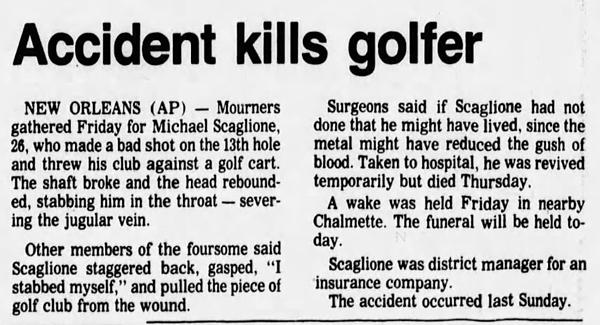
Regina Leader-Post - Apr 17, 1982

Louisville Courier-Journal - July 14, 1994
Posted By: Alex - Wed Sep 28, 2022 -
Comments (0)
Category: Death, Golf
The Fuse Ball
In 1926, Philip S. Kane of Pennsylvania received a patent for his "fuse ball" (Patent No. 1,583,721). It was a golf ball with a fuse. Before teeing off, you'd light the fuse, which would then start emitting smoke. That way, you could find the ball wherever you hit it, even if it landed in tall grass.According to various media reports, while testing his ball Kane accidentally set a wheat field on fire, but I haven't seen any proof to back up that story.
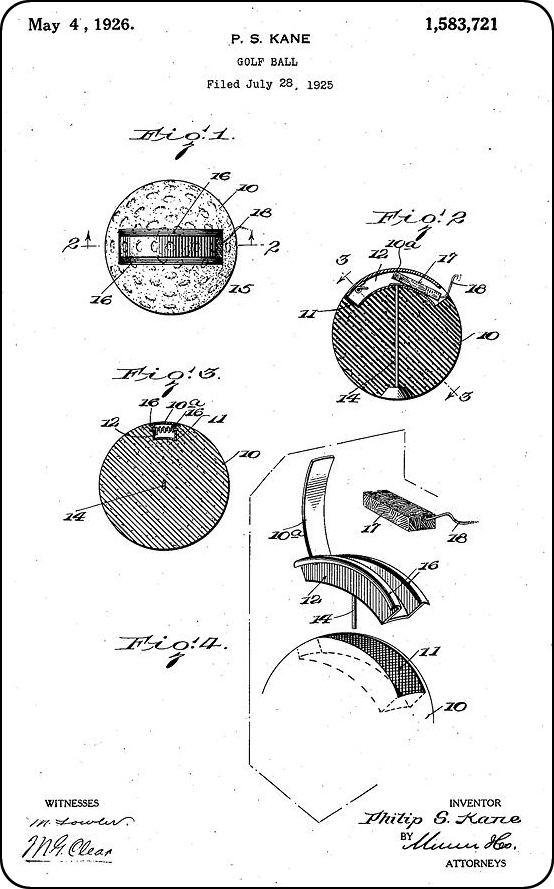
Posted By: Alex - Mon Aug 15, 2022 -
Comments (0)
Category: Sports, Golf, Patents, 1920s
Death by golf and peacocks
Oct 1951: Edward Harrison died in a freak golf accident, by managing to stab himself in the leg with a broken club. As he lay bleeding to death, he screamed for help. "Two other golfers said they twice heard screams, but thought they were the cries of peacocks from a peacock farm."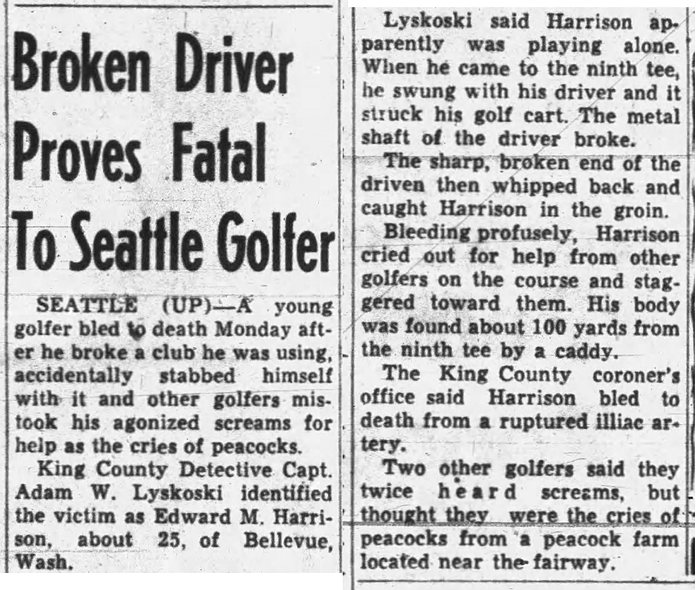
Deseret News - Oct 9, 1951
Posted By: Alex - Fri Jun 25, 2021 -
Comments (2)
Category: Death, Sports, Golf, 1950s
Shaver’s Golf
Shaver's golf = a game to find out the smallest number of strokes with which you can shave your face.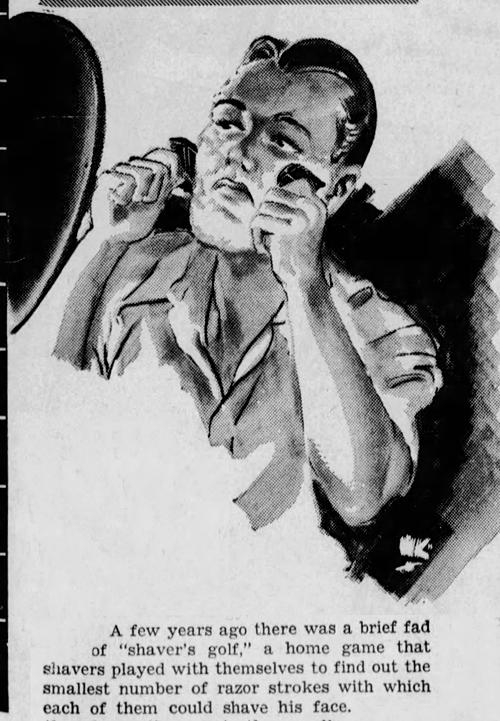
Minneapolis Star - Aug 6, 1939
A useful aid for this game would be the "stroke-counting razor" invented by engineers at Gillette a few years ago. Using this tool, Gillette determined that the average man takes about 170 strokes to shave his face. So, in the game of shaver's golf, I guess that 170 would be considered par.
Posted By: Alex - Tue Jan 12, 2021 -
Comments (4)
Category: Games, Sports, Golf, Hair and Hairstyling
Buried at the golf course
In 1989, a Canadian company tried to promote the idea of burying people at golf courses. They imagined that courses could add memorial walls made out of their patented "mod-urns" — hollow, cremain-filled building blocks that could be snapped together to make instant memorial walls.A company rep argued that this could be "a potentially lucrative business for golf courses, who could pack in up to 50,000 new 'members' per acre."

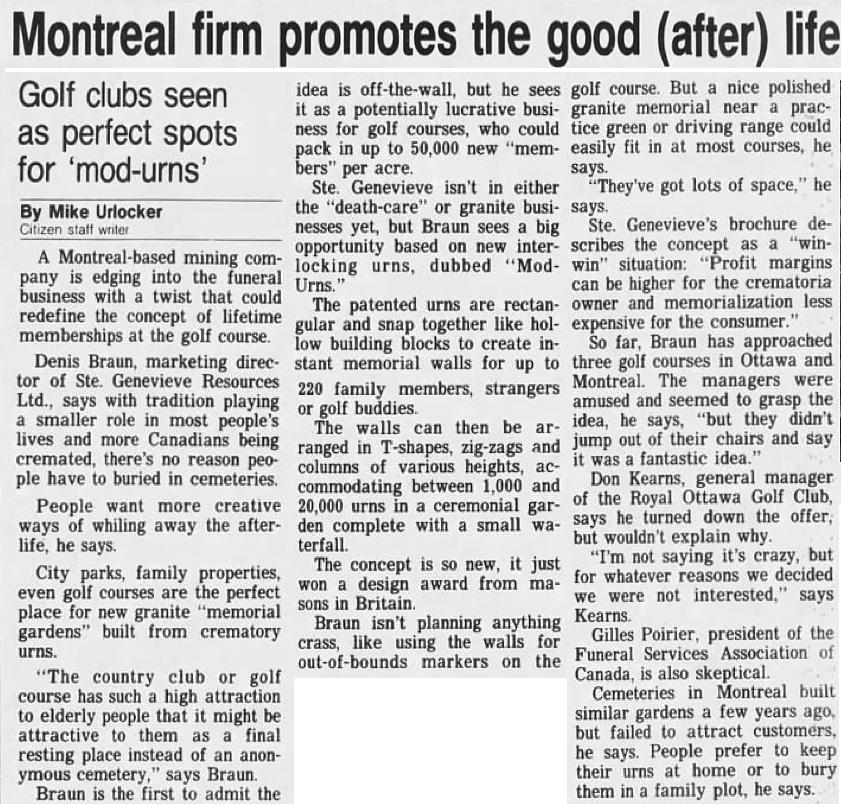
Ottawa Citizen - Sep 29, 1989
Posted By: Alex - Mon May 25, 2020 -
Comments (0)
Category: Death, Sports, Golf, Patents, 1980s
Isostatic Rebound Golf Course
The Valley of the Eagles golf course in the small town of Haines, Alaska boasts an unusual feature. It’s currently a nine-hole course, but due to the geological phenomenon of isostatic (or post-glacial) rebound, in a few decades it may be an 18-hole course.Post-glacial rebound is the phenomenon of a land mass rising after the weight of a glacier has been removed from it. This is occurring in Haines, at a rate of about 0.9 inches per year, and because the golf course borders the water, it's steadily growing in size as it rises above sea level, exposing more land. The course has already doubled in size since the 1960s.
More info: pasturegolf.com
Posted By: Alex - Fri Aug 02, 2019 -
Comments (2)
Category: Science, Sports, Golf, Natural Wonders
The Atomic Golf Ball
A demonstration that what is possible may not be what is practical.Developed by nuclear physicist William Davidson in 1950, a small amount of radioactive material at the core of the atomic golf ball allowed it to be found using a Geiger counter, should it be hit into the rough. But there were a few problems with the concept:
1: The Geiger counter needed to be pretty close to the ball (within 5 feet) to actually detect it.
2: Not many people own Geiger counters.
3: Even though a single ball didn't pose much of a radiation risk, a bunch of the balls stored together would be a problem. So, it wasn't possible for stores to stock and sell these.
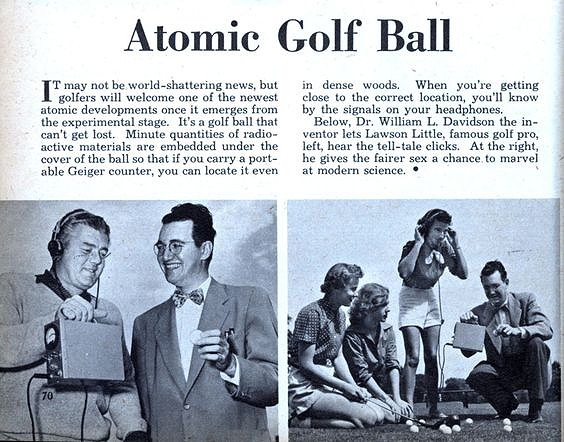
Mechanix Illustrated - Mar 1951
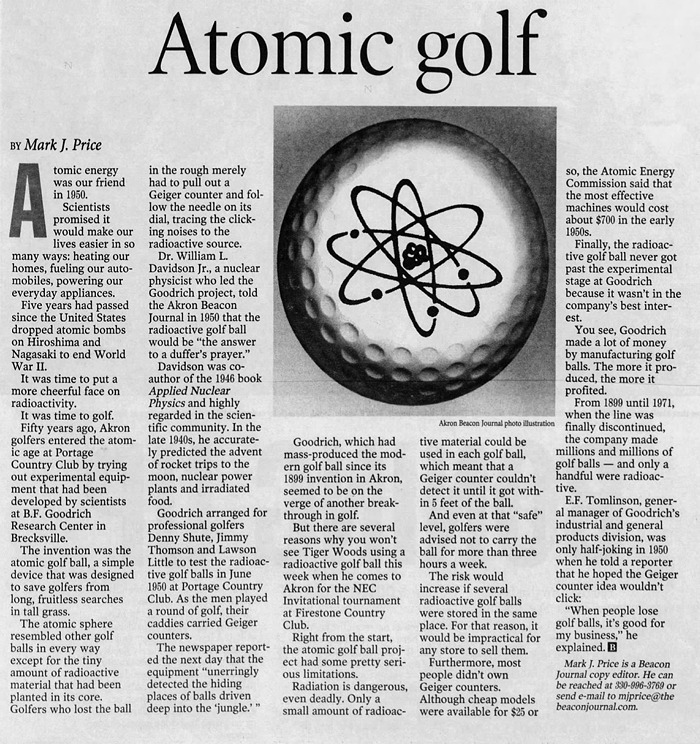
Akron Beacon Journal - Aug 20, 2000
click to enlarge
Posted By: Alex - Wed Jul 24, 2019 -
Comments (4)
Category: Sports, Golf, Atomic Power and Other Nuclear Matters, 1950s

| Who We Are |
|---|
| Alex Boese Alex is the creator and curator of the Museum of Hoaxes. He's also the author of various weird, non-fiction, science-themed books such as Elephants on Acid and Psychedelic Apes. Paul Di Filippo Paul has been paid to put weird ideas into fictional form for over thirty years, in his career as a noted science fiction writer. He has recently begun blogging on many curious topics with three fellow writers at The Inferior 4+1. Contact Us |




